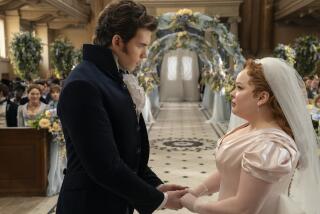Critic’s Pick: TV Picks: From tube to tomes, check out these books from television writers

Actress, writer and Web network proprietor Felicia Day, photographed in the L.A. Times Hero Complex photo studio at Comic-Con, in San Diego, July 9, 2015. Day is the author of a new memoir, “You’re Never Weird on the Internet (almost).”
Hi, and welcome to this special edition of TV Picks, featuring things that must be read to be consumed, let alone understood: books.
It’s still summer for a little while, and these portable and (mostly) breezy reads will cool you down as you sit on the beach, or by the pool, or in an airless candlelit room — however your holiday rolls, it’s none of my business, really. All have something to do with television, as we widely define it around here. (I’m looking at you, Internet.) All should make you feel (mostly) good about life, except that Tim and Eric book, which may leave you feeling uncomfortable, even a little nauseated.
SIGN UP for the free Indie Focus movies newsletter >>
Felicia Day: “You’re Never Weird on the Internet (almost)” (Touchstone). A sweet, tortured and incidentally inspirational comic memoir from actress, writer and YouTube content creator and channel head Felicia Day to set alongside Tina Fey’s “Bossypants,” Amy Poehler’s “Yes Please,” Mindy Kaling’s “Is Everyone Hanging Out Without Me?,” Lena Dunham’s “Not That Kind of Girl” and Sarah Silverman’s “The Bedwetter.” (It’s a genre already.)
Day is certainly the least well-known and conventionally successful of these women, but in her world, which may be your world, a power. You may know her from a minor part in a late season of “Buffy the Vampire Slayer,” or as the third star and object of the antihero’s love in “Dr. Horrible’s Sing-Along Blog,” or as Charlie Bradbury, an until-lately recurring character on the CW series “Supernatural.” (Charlie was killed near the end of last season; there is a fan-based Bring Back Charlie campaign underway.) Or from her own “The Guild” (2007-2012), a comedy about gamers (inspired by her own addiction to World of Warcraft), the first Web series I can remember that also felt like a solid sitcom. Or playing old video games with her brother Ryon on “Co-Optitude,” one of the series on her Web channel “Geek & Sundry.”
She calls herself “situationally recognizable” — “there are certain places where I’m a superstar, like San Diego Comic-Con, and … other places like San Diego ComicCon” — but she has more than 2 million followers on Twitter and her book, like those named above, serves as a reminder that while success is not divorced from luck, it is also not accidental. Like most interesting paths, hers was not a straight one, beginning with a home-schooled youth spent in relative social isolation — like Sally, whose life was saved by rock ‘n’ roll in the Velvet Underground song, Day’s was saved by Compuserve and adventure games — and a professional life dominated by the twin demons of perfectionism and self-doubt. And also like those books, it is a kind of guide to life that emphasizes recognizing quirks as strengths and changing the world so that it fits you, and not the other way around. Young people of both sexes and every gender should find much to empower them. (Older people, too, for that matter.)
Chris O’Dowd and Nick V. Murphy: “Moone Boy: The Blunder Years (Feiwel and Friends). Chris O’Dowd and Nick Vincent Murphy, the creators of the madcap period-pastoral Irish comedy “Moone Boy” (three seasons available on Hulu), turned to prose for this prequel/elaboration in which young Martin Moone acquires his dress-alike imaginary friend Sean Murphy (played by O’Dowd in the series). Walter Giampaglia, whose animations are featured in the series, illustrates, making this book not just a read but a lovely object.
The pages are lined as if for schoolwork; the text has the appearance of typewriting, with notes explaining some of the Irish terms and other words the authors want to explain or make a joke about. (It is a Lemony Snickett move.) It is a book for children, and for me. “The Blunder Years” goes places the series doesn’t — finding reasons for what the show happily takes for granted on the one hand and indulging in kid-lit fantasy not entirely on the other, with a lot of comical mystical rigmarole Martin has to go through to acquire his IF, or imaginary friend. They come in catalogs here and exist a priori rather than being imagined by the children they accompany; this is somewhat at odds with the series, but it works within its own delightful context.
I don’t think there’s much reason to worry about continuity or canonicity in any case, and it’s a treat to have a little more Moone in the world — dreamy, dippy, indomitable Martin Moone — even if David Rawle is not playing him. Still, given that O’Dowd and Murphy wrote the whole TV show between them, it is easy enough to hear Rawle’s voice and O’Dowd’s (both as character and narrator) coming off these pages. (There is an audio CD, as well, if you would like to hear O’Dowd’s actual voice; Murphy performs the footnotes and sundry other parts.)
Judd Apatow: “Sick in the Head: Conversations About Life and Comedy” (Random House). The Apatow empire is founded on his success in the movies, but he comes from television (and is back in it now, as an executive producer of “Girls”). If the shows he worked on and helped create were, for the most part, short-lived, they have high standing in the history of the medium: “Freaks and Geeks,” which he developed with creator Paul Feig and whose only season NBC did not even air in full, is the most often cited, given the stars it produced (thanks in no small part to Apatow’s post-cancellation support). But he also wrote for the great “The Larry Sanders Show” (where he also first directed) and co-created “The Ben Stiller Show” (12 episodes on Fox in 1992-93) and the “Freaks” quasi-sequel college comedy “Undeclared” (17 episodes on Fox in 2001-02).
Along with Lorne Michaels, Funny or Die proprietors Will Ferrell and Adam McKay and Comedy Central programming chief Kent Alterman, he’s a major energy vortex in American comedy, though you wouldn’t know it to hear him talk. Arranged alphabetically (by first name) with the serendipitous continuities and contrasts of an MP3 player on shuffle, this collection of interviews is a kind of stealth memoir: You will learn much about Judd while learning much about his interlocutors, many of whom he’s worked with. (As you know if you have watched his movies, seen him interviewed or read his tweets, Apatow is a sharer.) You will hear about his parents’ divorce, his feelings of alienation, his aches, his pains, his own marriage and parenthood, his desire for a better world and his fear of a meaningless universe. (Wife Leslie Bibb, a star of Apatow’s “This Is 40,” not to mention Bill Haverchuck’s teacher-crush on “Freaks and Geeks,” fills in some domestic details and gives the exterior view of the author.)
The interviews, some of which date back to Apatow’s teenage years, come from a variety of sources, including a transcribed commentary from the “Cable Guy” DVD, with producer Apatow, star Jim Carrey and director Ben Stiller; public panels; and, I was surprised to find, my own oral history of “Freaks and Geeks,” which ran in the Apatow-edited January 2013 comedy-special edition of Vanity Fair (minus the introduction and, interestingly, Stephen Lea Sheppard’s somewhat downbeat concluding quote; the whole piece can be read here).
Apatow’s selection of subjects includes mentors, heroes, colleagues and friends, older and younger and the same age as himself — people he thinks are funny, obviously, without necessarily sharing their temperament. They include Louis C.K., Mel Brooks, Mike Nichols, Albert Brooks, Stephen Colbert, Jon Stewart, Amy Schumer, Sandra Bernhard, Miranda July, Spike Jonze, Marc Maron, Harold Ramis, James L. Brooks, Seth Rogen and Jerry Seinfeld, among many more. What it has that some similar collections do not, besides access, — and if you’re into interviews with comedy writers, I also recommend Mike Sacks’ “Here’s the Kicker” and “Poking a Dead Frog” — is the element of professionals comparing notes (and friends sharing memories). That Apatow is talking to his peers allows for a more intimate and free-ranging conversation, cut loose from the requirements and limitations of conventional journalism. Sometimes they just talk about their kids.
Tim Heidecker and Eric Wareheim: “Tim & Eric’s Zone Theory: 7 Easy Steps To Achieve a Perfect Life” (Grand Central Publishing). The creators and stars of the Adult Swim series “Tom Goes to the Mayor,” “Tim and Eric Awesome Show, Great Job!” and “Tim and Eric’s Bedtime Stories” turn their hands to print in this disturbing parody of commercial self-help systems and cult religions, their insane mythologies and must-own merchandise.
Resemblances to Scientology, with its steps to secret knowledge and personal power, are of course intentional. (The pitch here seems to be exclusively to sad men, which makes it feel creepier than it already does.) Resemblances to the tracts of the Church of the Subgenius, that decades-old thousand-headed art project, are possibly not incidental. The book, which is more than profusely illustrated and full of charts and exercises and psychedelic excrescences, has the off-kilter, off-register, might-be-bad-for-you, probably-is-bad-for-you appeal of the duo’s TV work; indeed, it is rather nasty. All of which I say by way of recommendation.
Robert Lloyd uses his words to tweet @LATimesTVLloyd
MORE:
Jon Stewart leaves ‘The Daily Show’: The most memorable moments of the final episode
A ‘media meltdown’? Disney remark on TV viewing sends industry into tailspin
First GOP debate was more like a reality TV show
More to Read
The complete guide to home viewing
Get Screen Gab for everything about the TV shows and streaming movies everyone’s talking about.
You may occasionally receive promotional content from the Los Angeles Times.







